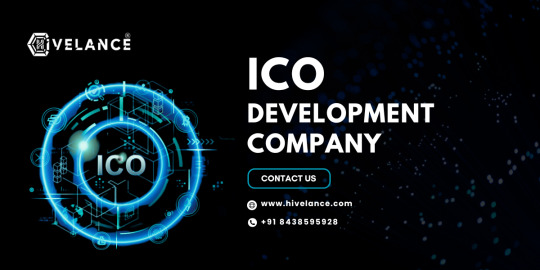#ICO Development Agency
Explore tagged Tumblr posts
Text
How to Market Your ICO with Effective ICO Development Solutions for 2025?

The cryptocurrency landscape is rapidly evolving, and as we step into 2025, Initial Coin Offerings (ICOs) are gaining traction as a viable means for startups and established companies alike to raise capital. However, the success of an ICO is not merely dependent on the idea behind the token; it is equally reliant on an effective marketing strategy that resonates with potential investors. In this blog, we will explore how to market your ICO using effective ICO development solutions, ensuring that your project not only stands out but also achieves its fundraising goals.
Understanding ICOs: A Brief Overview
Before diving into marketing strategies, it’s essential to grasp the fundamentals of an ICO. An ICO is a fundraising method where new cryptocurrencies or tokens are sold to investors, typically in exchange for established cryptocurrencies like Bitcoin or Ethereum. ICOs allow startups to bypass traditional fundraising methods, enabling them to raise capital directly from the public.
However, due to regulatory scrutiny and the prevalence of scams in the ICO space, building trust and transparency is critical. Thus, an effective marketing strategy must focus on educating potential investors about your project while demonstrating its legitimacy and value.
1. Building a Strong Foundation with ICO Development Solutions
Define Your Unique Selling Proposition (USP)
Your ICO’s success starts with a compelling USP. Clearly define what makes your project unique and valuable. Is it the technology behind the token, the problem it solves, or the team’s expertise? A strong USP will not only attract attention but also help you communicate your vision effectively to your audience.
Develop a Robust Whitepaper
A well-crafted whitepaper is a cornerstone of your ICO marketing strategy. It should detail your project’s goals, technical specifications, and the market problem it addresses. Additionally, include information about the team, token distribution, roadmap, and potential use cases. A comprehensive whitepaper instills confidence in potential investors and establishes your authority in the space.
Create an Engaging Website
Your website serves as the primary platform for sharing information about your ICO. Ensure it is user-friendly, visually appealing, and mobile-optimized. Incorporate engaging content, such as videos explaining your project, infographics showcasing your roadmap, and testimonials from industry experts. Your website should also feature a clear call to action (CTA) that guides visitors on how to participate in your ICO.
2. Leveraging Community Building and Engagement
Build an Active Community
Engaging with your audience is crucial for the success of your ICO. Create official channels on platforms like Telegram, Discord, and Reddit to facilitate discussions and answer questions. Regularly update your community on project developments, milestones, and news. Encourage community participation through contests, polls, and AMAs (Ask Me Anything) sessions, fostering a sense of ownership among your supporters.
Utilize Social Media
Social media platforms are powerful tools for promoting your ICO. Share regular updates, informative content, and engaging visuals across platforms such as Twitter, Facebook, and LinkedIn. Use targeted ads to reach potential investors and leverage influencers in the crypto space to amplify your message. Engaging content, such as articles, infographics, and videos, can help establish your credibility and attract a larger audience.
3. Strategic Partnerships and Collaborations
Collaborate with Industry Influencers
Partnering with influencers in the crypto space can significantly boost your ICO’s visibility. Identify key opinion leaders who align with your project’s values and objectives. Collaborate on content creation, host joint webinars, or seek endorsements to leverage their audience. Influencers can help build trust and credibility, making them valuable allies in your marketing efforts.
Forge Partnerships with Other Projects
Consider forming strategic partnerships with other blockchain projects that complement your offering. These collaborations can enhance your project’s credibility and provide access to a broader audience. Joint marketing campaigns, cross-promotions, and community engagement initiatives can create mutual benefits, driving interest in both projects.
4. Implementing Effective PR Strategies
Press Releases and Media Outreach
A well-timed press release can generate significant media coverage for your ICO. Craft compelling press releases that highlight key milestones, partnerships, or innovative features of your project. Target reputable crypto and finance publications, bloggers, and journalists to maximize your reach. Building relationships with journalists can help ensure that your project receives the attention it deserves.
Content Marketing
Develop a content marketing strategy that includes blog posts, articles, and educational resources related to your ICO. Share valuable insights on industry trends, technology advancements, and the benefits of your project. High-quality content not only positions you as an authority in the field but also attracts organic traffic to your website.
5. Navigating Regulations and Compliance
Understand Legal Frameworks
As ICOs face increasing scrutiny from regulatory bodies, it is crucial to navigate legal frameworks carefully. Consult with legal experts to ensure compliance with relevant regulations in your jurisdiction. Clearly communicate your compliance measures to potential investors, as transparency in this area can significantly enhance trust and credibility.
KYC and AML Procedures
Implement Know Your Customer (KYC) and Anti-Money Laundering (AML) procedures to comply with regulations and protect your investors. Clearly outline these procedures on your website and during the onboarding process, ensuring that potential participants understand the steps involved.
6. Analyzing and Adjusting Your Strategy
Monitor Analytics
Utilize analytics tools to track the performance of your marketing efforts. Monitor website traffic, social media engagement, and community sentiment to gain insights into what works and what doesn’t. This data will enable you to make informed decisions and adjust your strategy as needed to maximize effectiveness.
Feedback Loop
Encourage feedback from your community and investors. Understanding their concerns and suggestions can provide valuable insights into how you can improve your marketing strategy and project. Foster an open dialogue to build trust and transparency with your audience.
Conclusion
Marketing your ICO in 2025 requires a well-rounded approach that combines effective ICO development solutions with strategic marketing initiatives. By defining your unique selling proposition, building a strong community, leveraging partnerships, implementing PR strategies, navigating regulations, and continuously analyzing your efforts, you can significantly enhance your ICO’s visibility and attract potential investors.
As the cryptocurrency landscape continues to evolve, staying adaptable and responsive to market changes will be crucial for the success of your ICO. Embrace innovation, engage with your community, and position your project for success in this dynamic environment.
#ICO Development Solutions#ICO Development#ICO#ICO Development Services#ICO Development Agency#ICO Development Company
0 notes
Text
ICO Development Company - Unlocking the Potential with Maximizing Fundraising Opportunities
Fundraising is a crucial aspect of any project, especially in the fast-evolving world of blockchain technology. Initial Coin Offerings (ICOs) have emerged as a powerful tool for raising capital, enabling projects to attract investment from a global audience. This blog will delve into the various aspects of ICO development and how it can significantly enhance your fundraising opportunities.

What is ICO Software?
ICO software is a comprehensive platform that facilitates the creation, management, and execution of Initial Coin Offerings. It encompasses a suite of tools and applications designed to streamline the ICO process, from token creation and distribution to smart contract deployment and compliance. The software ensures that all technical aspects are handled efficiently, allowing project owners to focus on their core objectives.
What is ICO Development?
ICO software development is the end-to-end process of planning, creating, and launching an Initial Coin Offering. It involves various stages, including conceptualization, whitepaper drafting, token development, smart contract programming, website creation, marketing, and compliance with regulatory standards. ICO development is critical to ensuring that the ICO is secure, transparent, and appealing to potential investors.
What are the Features of ICO Development?
ICO development offers several key features that contribute to the success of your fundraising campaign:
Token Creation: Custom tokens are developed on popular blockchain platforms like Ethereum, Binance Smart Chain, or Solana, tailored to your project's specific needs.
Smart Contracts: Secure and immutable smart contracts govern the token distribution and management process.
KYC/AML Compliance: Integrated Know Your Customer (KYC) and Anti-Money Laundering (AML) processes ensure regulatory compliance and enhance investor trust.
Wallet Integration: Seamless integration with popular digital wallets for easy token storage and transfer.
Dashboard: A user-friendly dashboard for investors to monitor their contributions and token holdings.
Security Protocols: Advanced security measures to protect against cyber threats and ensure the integrity of the ICO.
Benefits of ICO Development
The benefits of ICO development are manifold, making it an attractive fundraising method for many projects:
Global Reach: ICOs allow projects to tap into a global pool of investors, providing access to a larger amount of capital.
Cost-Effective: Compared to traditional fundraising methods, ICOs are relatively cost-effective, with lower barriers to entry.
Speed: The ICO process is faster, enabling projects to raise funds quickly and efficiently.
Transparency: Blockchain technology ensures transparency in transactions, boosting investor confidence.
Innovation: ICOs promote innovation by enabling projects to leverage cutting-edge blockchain technology.
What are the ICO Development Services?
ICO development encompasses a range of services that ensure the successful execution of an Initial Coin Offering:
ICO Consultation: Expert advice on the feasibility and strategy of your ICO.
Whitepaper Drafting: Professional drafting of a comprehensive whitepaper that outlines your project’s vision, technology, and roadmap.
Token Development: Creation of custom tokens tailored to your project’s needs.
Smart Contract Development: Secure smart contract programming to automate the token distribution process.
Website Development: Creation of a professional and informative website to attract potential investors.
Marketing and PR: Strategic marketing and public relations campaigns to promote the ICO and reach a wider audience.
Compliance Services: Ensuring the ICO adheres to all relevant legal and regulatory requirements.
Why Should You Work for ICO Development with Hivelance?
Choosing the right partner for ICO development is crucial to the success of your fundraising campaign. Hivelance offers several advantages that make it an ideal choice:
Expertise: Hivelance boasts a team of experienced blockchain developers and consultants who have successfully launched numerous ICOs.
Comprehensive Solutions: From initial consultation to post-ICO support, Hivelance provides end-to-end ICO development services.
Security Focused: Hivelance prioritizes security, implementing advanced protocols to protect your ICO from potential threats.
Regulatory Compliance: Hivelance ensures that your ICO complies with all relevant regulations, minimizing legal risks.
Client-Centric Approach: Hivelance works closely with clients to understand their unique needs and deliver customized solutions that meet their goals.
In conclusion, ICO development is a powerful tool for increasing fundraising opportunities for your project. By leveraging the expertise of a professional ICO development company like Hivelance, you can ensure a seamless, secure, and successful ICO, unlocking the full potential of blockchain technology for your project.
#ICO Development Company#ico development services#ico development agency#ico development solutions#ico marketing#Launch Your Own ICO
1 note
·
View note
Note
Hi can I ask an OCs question. Does Kiss exist in the same universe as Yoki and Ishawuu or are they different settings bc they seem to have wildly different things going on
Totally different universe !!
Kiss is like modern day normal world stuff (Altho girl a+b are also technically in their world so ig theres the murders. but besides that). She also doesnt have an actual plot or anything she mosts exists for me to put her in cute outfits and make silly headcanons abt. Or I guess canon facts. Since I made her. But she does have some lore!! Mom was a fashion designer, she has a pro gamer boyfriend, etc etc
Oh!! But kinda as a joke Kiss (Or maybe a descendent of her?) does exist as a celebrity in pastex
Ishawuu and Yoki are in an entirely different world. Though theoretically it could be the same since pastex is just set in the future. Anyway, they're in a story called Pastex (Short for "Past Expiration". But I never call it that bcs im lazy) set ~500 years from now, and about 350-400 years after war that caused a nuclear winter across the world, and destroyed most habitable land. Around 80-90% of the population also died either from the initial bombs, the wildfires, or the winter. The world remains covered in ice and snow, and the sky is still black with soot. Two main areas were habitable post-bombing due to temperature, available food, etc. They're around Chile/Argentina and Australia. All the characters i've talked abt are in the Argentina/Western settlement.
Yoki and Ishawuu are functionally immortal due to an implant that they (+ some others) got pre-war, developed by Koro, a powerful group that now (in pastex) serves as the government in the western settlements. At the start of the story, they're both working as social guards (Basically high ranking police) for Koro.
You may also see me talking abt Day, Ico, and The Grandmaster, who are all characters from pastex too! The Grandmaster is the currently leader of Koro, who Ishawuu and Yoki work under. His family has been leading Koro since it was still a tiny agency!!
Day is a character from a small village unincorporated into Koro until he was about 10/11 when it essentially bought them and their lives. So he hates Koro. lol. Ico was Day's younger brother who died about 10 years before the story.
#I took this as an excuse to talk abt pastex SORRY#pastex#Ive been developing pastex for a little under three years mow iirc#ive been wanting to make an actual comic but I keep putting it off lolz
11 notes
·
View notes
Text






Tricuno kipo si concepts above ft. kipo recolors based off me learning the purple-pink tint was going to be more subtle originally, traces of trico himself & traces of a couple timbercats.
Kipo si lore concepts under the cut.
Okay so the original idea for half-tricuno si was that some random surface humans found trico dna & were like "lol what would happen if we injected it into this baby lol" & then it turned out that the dna had smth to do with the boy & trico, like the original them way before kipo's time or before the mutant-ing, and si was some sort of reincarnation/representation of their friendship, and that friendship was her anchor. And then i thought about a colony/society of tricuno mutes who're descended from the original boy & trico's village, & they're all part mutes who can transform like the part megamutes can, and whenever a megamute comes along they train them in the ways of an anchor; the default anchor is the friendship of trico & the boy. So kipo si doesn't usually wear as much clothes bc they're so in tune with their mute halves, using feathers & tough skin to protect against mild elements?
potential flaws for the tricuno & human symbiotic colony(cw forced loss of identity/memories discussed in the last one): -too much pressure on mega mutes or chosen-one-descended teens once they come of age, encanto-style? -due to living in close symbiotic relationships w tricuno for years, and being part or all mutes, the tlg(guardian clan??) colony has developed their own animalistic language, all chuffs and purrs and whines and trills and whistles and--basically it's near impossible for them to communicate w other mutes, let alone humans -could steal the plot of ico & have offspring w certain traits be cast out to the mercy of the rest of the surface world -everyone who joins the colony is mutated if they're human? All r given anchors, but keeping sapience/identity/memories is not guaranteed. -the more humanoid a tricuno mutnt, the more frail they're treated/less agency they're given, a little like old fashioned sexism
and then i was like "wait wouldn't it be dope if they were like:"

#kataow#kipo#kipo and the age of wonderbeasts#the last guardian#tlg#self insert#kataow self insert#kipo si#my drawings#btw the humanish trico next to kipo is based off my og humanish trico design &#loosely based on the color palette for the original tlg gp trico
6 notes
·
View notes
Text
From Idea to Launch: How a Crypto Consulting Agency Can Fast-Track Your Success
Cryptocurrency and blockchain innovations have surged over the past few years, spawning an ecosystem of startups, decentralized protocols, and disruptive fintech models. However, as more founders and companies enter the space, the complexity of building a crypto project from the ground up has also intensified. From navigating tokenomics and regulatory compliance to smart contract auditing and exchange listings, launching a crypto product is no longer a simple journey. This is where a crypto consulting agency becomes a powerful ally.

A crypto consulting firm provides end-to-end support across the lifecycle of a blockchain project—helping turn raw ideas into market-ready offerings. Whether you’re planning an ICO, building a DeFi app, or launching a new token, these agencies can accelerate timelines, avoid costly mistakes, and dramatically improve your odds of success.
Ideation & Strategy: Turning a Vision into a Viable Crypto Product
Every crypto project starts with an idea—but turning that idea into a viable product takes strategic planning. A crypto consulting company works with founders to refine their vision and align it with market needs, technical feasibility, and token utility.
Consultants help you answer critical early-stage questions:
What blockchain should you build on—Ethereum, Solana, Arbitrum, or something else?
Should your project launch a coin or a token?
How will the tokenomics drive demand, usage, and sustainability?
What problems does your project solve, and for whom?
With experience across multiple verticals—DeFi, NFTs, GameFi, and enterprise blockchain—a cryptocurrency consulting agency brings clarity and structure to your ideation process. Instead of guessing, you get a data-backed, real-world-informed roadmap.
Tokenomics & Whitepaper Development: Laying the Project Foundation
One of the most common reasons blockchain projects fail is flawed tokenomics. An experienced crypto consulting firm helps you design a sustainable token model that balances utility, distribution, and long-term value creation.
This includes:
Choosing fixed or inflationary supply models
Crafting vesting schedules for team, investors, and community
Setting staking, yield, or burn mechanisms for token engagement
Aligning governance structures with decentralization goals
In parallel, the agency helps create a professionally structured whitepaper. This document serves as the core pitch for your project—outlining the tech, vision, roadmap, utility, and team in a way that builds investor and community trust. A well-written whitepaper, backed by sound tokenomics, can be the difference between attracting strategic partners or being dismissed as another hyped-up idea.
Legal, Compliance & KYC/AML: Navigating the Regulatory Minefield
Regulatory compliance is no longer optional in today’s crypto landscape. As global governments tighten their grip on digital assets, ensuring legal adherence from day one is crucial. A reputable cryptocurrency consulting company provides guidance through:
Jurisdiction analysis and legal entity formation
Token classification: utility vs. security tokens
GDPR, KYC/AML compliance frameworks
Partnership with blockchain law firms, if needed
Whether you're targeting a compliant STO in Europe or planning an ICO under U.S. SEC-safe guidelines, cryptocurrency consulting solutions ensure you’re not putting your investors—or your project—at risk. This legal foundation protects you from fines, shutdowns, or future listing rejections.
Product Development Oversight: From MVP to Mainnet
While many agencies don’t directly develop the product, they often manage or oversee development cycles through a network of vetted partners or in-house technical teams. This includes:
Designing a minimum viable product (MVP)
Smart contract architecture and auditing
Wallet integration and interoperability
Launching on testnet and mainnet
A crypto consulting agency ensures your development roadmap is realistic and market-driven, preventing scope creep and aligning your release with funding milestones. They also stress-test your smart contracts, coordinate audits, and prepare your infrastructure for scalability and security.
Marketing, Community & Branding: Building Hype the Right Way
A technically sound project without community traction is like a rocket with no fuel. Crypto consulting firms typically offer branding and marketing advisory services—or collaborate with partner agencies—to give your launch the visibility it needs.
Key services include:
Building a narrative and visual brand identity
Crafting social media and content strategies
Running bounty, airdrop, and ambassador campaigns
Managing community growth on Discord, Telegram, and X (formerly Twitter)
By positioning your project as trustworthy, transparent, and mission-driven, crypto consulting services help you organically attract users, influencers, and early investors. Authentic community engagement is often the #1 factor behind successful token launches—and agencies know how to spark it.
Fundraising Support: Attracting Strategic Capital
Fundraising is where a well-connected crypto consulting company truly proves its worth. These agencies often maintain relationships with venture capitalists, angel investors, launchpads, and IDO/IEO platforms. With their guidance, you can:
Craft compelling investor decks and data rooms
Prepare for due diligence with token metrics and market potential
Get warm intros to relevant funds and launchpads
Plan the right fundraising mix—private sale, seed, IDO, or public sale
Rather than sending hundreds of cold emails, you gain access to curated opportunities with crypto-native investors who understand your value prop and can accelerate your growth.
Launch Execution: From TGE to Exchange Listings
The moment your token goes live, every detail matters. A cryptocurrency consulting agency coordinates launch logistics to ensure a smooth Token Generation Event (TGE), including:
Finalizing smart contract deployment
Airdrop management and claim portals
Exchange listing strategy—CEX vs. DEX
Price protection mechanisms and liquidity planning
Post-launch, they assist in managing token volatility, sustaining liquidity, and engaging with users to prevent hype from fading. This transitional phase—from TGE to early adoption—is one of the most fragile in a project’s lifecycle. Having an agency to manage timelines, vendors, and community expectations is a competitive edge.
Post-Launch Growth: Sustaining Momentum
Most crypto projects decline after launch because they have no clear post-TGE growth plan. A seasoned crypto consulting firm supports you long after your token hits the market. Their post-launch services may include:
DAO creation and governance onboarding
Partnership development with dApps, protocols, or marketplaces
CEX listing upgrades and market-making strategies
Strategic pivoting based on token performance data
Your goal isn’t just to launch a token—but to build a sustainable crypto business. Crypto consulting experts help transition your project from speculative hype to long-term utility and adoption.
Choosing the Right Crypto Consulting Agency: What to Look For
Not all agencies offer the same level of expertise or credibility. When evaluating a cryptocurrency consulting firm, consider:
Their previous project success rate
Range of services (end-to-end or niche-specific)
Partnerships with legal, tech, or marketing vendors
Client testimonials and industry recognition
Transparency in pricing and deliverables
Also, make sure their team has both technical and business experience—not just marketers or generalists. You need people who understand how blockchain systems work and how to grow a user base in the crypto ecosystem.
Conclusion: The Shortcut to Crypto Startup Success
Building and launching a crypto project in today’s competitive landscape is complex, costly, and high-stakes. But with the right crypto consulting agency at your side, the journey becomes faster, smoother, and far more strategic. From refining your concept and legal compliance to smart contract audits, marketing, and token launches—consulting firms act as your operational co-pilot.
By choosing a team that understands the ecosystem inside out, you avoid common pitfalls, optimize capital efficiency, and unlock connections that would otherwise take years to build. Whether you're an enterprise exploring tokenization or a startup founder with a vision, crypto consulting services can turn your idea into a thriving, real-world product—on-chain and on time.
0 notes
Link
0 notes
Text
Top 10 Cryptocurrency Blockchain Development Agencies: Building the Future, One Block at a Time

Ready to take your blockchain idea and transform it into a fully functioning cryptocurrency? Whether you're looking to launch a new coin, build a decentralized application (dApp), or just dive into the world of smart contracts, these agencies are the pros you need on your side. So, let’s go ahead and explore the Top 10 Cryptocurrency Blockchain Development Agencies, with just the right amount of humor, and (hopefully) no technical jargon that makes your head spin.
Pearl Lemon Crypto Let’s kick things off with Pearl Lemon Crypto—the company that's been running the digital game for nine years, and is ready to bring your blockchain ideas to life. From building decentralized apps (dApps) to smart contracts and everything in between, they’ve got the technical expertise to make your crypto project a reality. With a proven track record in digital marketing, lead generation, and web development, this agency knows how to get your blockchain project out of the realm of ideas and into the hands of users. Pearl Lemon Crypto isn’t just another agency—it’s your ticket to crypto success. Check out Pearl Lemon Crypto to see how they can help you build the future.
Blockchain App Factory If you’re looking for a blockchain development agency that can create tailored solutions to meet your specific needs, Blockchain App Factory is a strong contender. Specializing in everything from blockchain consulting to full-scale dApp development, they’re a one-stop shop for those wanting to tap into the power of decentralized tech. Think of them as the Swiss Army knife of blockchain development—minus the confusing instructions. Learn more about Blockchain App Factory.
LeewayHertz LeewayHertz is a blockchain agency that doesn’t just talk the talk—they walk the walk (or should we say, "code the code"?). With expertise in building enterprise-grade blockchain solutions, they’ve helped Fortune 500 companies and startups alike leverage blockchain to solve real-world problems. Whether you're working on a supply chain solution or an ICO, they have the skills to deliver results. Visit LeewayHertz.
OpenZeppelin If you’ve heard of Ethereum, you’ve probably come across OpenZeppelin—the security-focused agency that’s leading the way in blockchain development. Known for their security audits and libraries of open-source tools, OpenZeppelin ensures that your project is not only functional but also secure. After all, the only thing worse than a bug is a hack, right? Check out OpenZeppelin.
HashCash Consultants HashCash Consultants is one of the top agencies when it comes to blockchain innovation. Whether you’re working on creating your own cryptocurrency, launching an ICO, or implementing blockchain into your business model, this agency’s solutions have you covered. With a focus on not just development but also marketing and blockchain-based financial services, they’re your all-in-one crypto partner. Visit HashCash Consultants.
Altoros Looking for a blockchain development company that loves diving deep into the technical side? Altoros specializes in custom blockchain development, smart contract auditing, and enterprise blockchain solutions. With a focus on providing end-to-end blockchain services, they’re perfect for those who need complex, robust, and scalable blockchain systems. Think of them as the architects of the blockchain world, but with better office snacks. Learn more at Altoros.
Solulab Solulab offers a full suite of blockchain development services that include everything from cryptocurrency exchange development to wallet development and ICO solutions. Their diverse expertise means they can handle everything from the planning stages to deployment and beyond. If blockchain were a competitive sport, Solulab would definitely be on the podium. Check out Solulab.
Blockchain Development Company Blockchain Development Company provides top-tier blockchain solutions for a wide range of industries. They help companies build blockchain networks, develop dApps, and create custom ICO solutions with a focus on security and scalability. It’s like a trusted advisor in the blockchain space, offering both wisdom and execution. Visit Blockchain Development Company.
Appsrhino If you want blockchain services with a side of mobile app development, Appsrhino might be the right choice for you. Specializing in integrating blockchain technology with mobile apps, they’re your go-to if you want to create crypto wallets, tokenization apps, or even decentralized gaming platforms. It’s like blending two worlds of technology into one tasty product. Check out Appsrhino.
TechAlpine Last but certainly not least, TechAlpine provides blockchain development solutions that range from creating digital currencies to building secure peer-to-peer networks. They pride themselves on understanding the needs of the blockchain world and delivering the right solution for each client, making sure your project not only works but thrives. It’s like the trusty sidekick to your blockchain superhero journey. Learn more about TechAlpine.
There you go! These 10 blockchain development agencies are all about bringing your crypto project to life. Whether you’re working on your first dApp or need an entire blockchain ecosystem, these agencies have the skills to make it happen. So, why wait for the future when you can build it today? Let’s get coding!
#crypto#forextrading#forex expert advisor#forex market#forex#forex indicators#forex robot#blockchain#forexsignals#stockmarket
0 notes
Text
The Evolution of Token Development Services Over the Years

Introduction
The landscape of cryptocurrencies has changed drastically since Bitcoin emerged in 2009. A niche experiment in digital currency has morphed into a multi trillion dollar ecosystem with a vast amount of use cases reaching from DeFi and NFTs and many other applications. At the heart of many such innovations lie crypto tokens, and their rise means exponential growth in demand for token development services.
Hence, how have token development services evolved through the years? In this blog post, we will go deep into elaborating on what crypto tokens are, why it is important to understand their development processes, how the service industry has evolved, and how the future might look.
What is a Crypto Token?
A crypto token is in essence a digital asset sitting on top of an existing blockchain, with the Binance Smart Chain and Ethereum networks being the most popular choices upon which to build. Unlike Bitcoin or Ethereum, having their own blockchain upon which they run, tokens utilize already existing infrastructure and smart contracts with the intention to serve certain purposes. They could represent anything from being a virtual currency, share ownership, voting rights, and access to features on a platform.
Tokens are usually created using some sort of predefined standards as set forth by ERC-20, ERC-721, BEP-20, and others. Such standards would set forth the rules that govern token behavior, how tokens are transferred from one party to another, and ways in which smart contracts could interface with them.
Importance of Understanding Token Development Services
As blockchain adoption increased, many major companies and various startup enterprises started wondering about token creation on their own. However, a token that is secure, efficient, and scalable is anything but simple, requiring much more consideration than coding alone.
Token development services typically offer the following:
Smart contract development
Selection of token standards (ERC-20, BEP-20, etc.)
Auditing and security testing
Tokenomics design
Deploying on testnet or mainnet
Integration into wallets and exchanges
By recruiting such token development services, businesses will ensure that their token is both technically flawless and legally and economically sound.
Evolution of Token Development Services Over the Years
Token development services journey can be divided into multiple significant eras:
Early Days (2013 – 2016)
Before Ethereum launched, to create a new crypto asset usually meant forking Bitcoin’s codebase. This was technically challenging and limited to a few developers. Token development was manual, inconsistent production, and lacked any standards.
Ethereum & ERC-20 (2015 – 2017)
With the launch of Ethereum, token development entered its revolution phase. Now, using smart contracts, developers could launch tokens on-chain without first creating a separate blockchain. When the ERC-20 standard came into being in 2015, it further streamlined conversion of tokens to fast, secure, and easy. As a result, ICOs began to disappear in large numbers; in 2017 alone, hundreds of tokens were created.
The ICO Era's Growth of Development Agencies (2017–2018)
The demand for token development rose with the spurt of ICOs, thus giving rise to dedicated token development companies offering solutions from start to finish, including white paper writing, marketing, and legal counseling. This boom also gave rise to scams and poorly constructed projects, underscoring the need for smart contract audits and professional supervision.
Token Standard Diversification (2018–2020)
Other standards, such as ERC-1155 (multi-token standard) and ERC-721 (non-fungible tokens), started to appear outside of the ERC-20 domain. The tokens stopped being mere fundraising tools and started being integral to games, art, supply-chain, and governance systems. Accordingly, token development services had to be set up so as to provide cross-chain compatibility, DeFi integration, and NFT minting platform services.
Maturity Era (2021-2024)
With this phase, speculation gave way to real-life applications. Security was paramount, so it became de rigueur to audit the services. The token was designed with legal compliance that is, with the SEC in mind. By promoting the swift prototyping and launch of tokens, low-code and no-code tools like TokenMint and Moralis eased the entry.
How Far Token Development Has Come?
From a mostly manual developer-oriented process, token development was engineered into a streamlined modular services industry. Currently, services provide:
Pre-audited smart contract templates
Multi-chain deployment (Ethereum, BSC, Solana, Avalanche, etc.)
Full-stack dApp integration
Regulatory advisory
DAO infrastructure and governance modules
In terms of UX, a tremendous leap has been made. Users can now smoothly engage with tokenized systems via Web3 wallets and mobile apps-a feat that was almost unreachable just some few years back.
Predicting the Future of Crypto Tokens
Notable trade names will be allowed on the highway of new era token creation, so also must it include real-world asset tokenization, interoperability, and AI integration.
Data-driven AI-generated smart contracts are designed to optimize tokenomics.
Tokenized IDs tied to self-sovereign credentials
Fractional ownership in everything from artwork to carbon credits
Regulated token offerings (RTOs) in compliance with national legislation
Cross-chain tokens using LayerZero- and Wormhole-like interoperability protocols
Also, governments and traditional institutions may start using tokens for payroll, record keeping, and digital voting.
Final Thoughts
The growth of the blockchain industry is reflected in the evolution of token creation services. From the early days of coding bespoke coins to the current full-service firms and automated platforms, token creation has become more convenient, secure, and business-oriented.
With crypto spreading further into mainstream sectors, tokens will become the fundamental infrastructure of digital economies, rather than speculative instruments, but indispensable tools for innovation and ownership. Whether you're a startup, a creator, or a global business, grasping the past and future of token development is critical to mapping out this new territory.
0 notes
Text
TNC Crypto — A Powerful Webflow Template for Modern Finance
With clean UI, responsive design, and tailored crypto features, TNC Crypto gives you the tools to move fast and look sharp. Let’s explore what makes this template ideal for finance and Web3 ventures looking to build trust and traction online.

Who’s This Template For?
Crypto Startups: Launchpad, ICO, DAO, or DeFi? This template adapts to your flow.
Blockchain Developers: A fast, customizable solution to showcase your Web3 projects.
Fintech Innovators: Ideal for emerging digital banks, exchanges, or investment apps.
Agencies & Freelancers: Build impressive client crypto sites with minimal dev work.
Key Features of the TNC Crypto
Here’s why the TNC Crypto template deserves your attention — each feature is crafted to elevate your brand and engage your users from first scroll to final CTA.
Customizable Crypto-Centric Design
🎯 Tailor your visuals, fonts, and layout with Webflow’s intuitive editor.
Perfect for fast pivots or rebrands, this template offers layout flexibility without compromising performance. Every section is styled with modern fintech in mind.
Lightning-Fast Performance
⚡ Built with lightweight components for high-speed delivery and smooth transitions.
TNC Crypto isn’t just good-looking — it’s optimized for speed. Fast-loading pages reduce bounce rates and improve SEO, keeping users engaged.
Responsive for All Devices
📱 Pixel-perfect design on mobile, tablet, and desktop.
No matter where your users land — they’ll see your project in the best light. Full responsiveness ensures your UX feels premium across screens.
Dedicated Pages for Tokenomics & Roadmaps
🧭 Communicate project goals, metrics, and timelines clearly.
Tailored pages help you explain your crypto journey effectively, building trust with your audience and potential investors.
CMS-Ready Blog and News Section
📰 Easily update news, press releases, and blog posts with Webflow CMS.
Keep your community informed and improve organic reach through consistent content. The built-in CMS makes publishing updates a breeze.
Interactive Components & Animations
💫 Scroll-based effects, subtle transitions, and dynamic sections.
Motion matters. TNC Crypto includes pre-built animations that enhance storytelling and brand expression without the extra development burden.
SEO & Accessibility Best Practices
🔍 Semantic structure, alt text support, and metadata-ready.
Rank higher and reach more users. Built-in SEO capabilities and accessible design help ensure that your content works for everyone.
Professional Webflow Structure
🧩 Clean class naming, reusable components, and pre-defined styles.
Whether you’re a solo founder or part of a team, this structure accelerates builds, simplifies handoffs, and supports long-term scalability.

Ready to Build a Stunning Crypto Site?
With the TNC Crypto Webflow Template, launching your next Web3 platform doesn’t have to involve expensive developers or complex frameworks. It’s fast, scalable, and beautiful — just like your crypto vision.
👉 Get the TNC Crypto Template and start building today
Final Thoughts
In a competitive digital finance landscape, standing out is essential. TNC Crypto delivers on design, performance, and flexibility — giving your project the credibility it deserves.
#webflow#webflowtemplates#websitetemplate#template#web design#ui ux design#web development#webflowdesign#crypto#degital marketing
0 notes
Text
Cost to Create Your Own Cryptocurrency: Full Breakdown & Guide

As the digital economy expands, creating your own cryptocurrency has become more than just a tech experiment — it’s now a legitimate way to build decentralized ecosystems, raise capital, or launch next-gen business models. Whether you're a startup founder, a blockchain enthusiast, or a tech-savvy entrepreneur, understanding the cost to create your own cryptocurrency is crucial before diving into the development process.
This guide breaks down the overall expenses, influencing factors, and tips to keep your costs in check when launching a cryptocurrency.
���� What Is a Cryptocurrency?
Cryptocurrency is a digital or virtual currency that uses cryptography for security. Unlike traditional fiat currencies, cryptocurrencies are decentralized and typically built on blockchain technology. Some well-known cryptocurrencies include Bitcoin, Ethereum, and Binance Coin.
You can create:
A coin (with your own blockchain)
A token (built on an existing blockchain like Ethereum)
Both require different development paths and costs.
💡 Why Create Your Own Cryptocurrency?
Before we explore costs, let’s understand why you might want to build one:
Raise Funds via ICO or IEO
Power Decentralized Applications (dApps)
Enable Secure Transactions
Build a Custom Blockchain Ecosystem
Create Reward Systems or In-App Currencies
💰 Cost to Create Your Own Cryptocurrency: Key Factors
The cost to create your own cryptocurrency varies significantly depending on the complexity, features, blockchain type, and who you hire. It can range from $5,000 to over $100,000. Here's a breakdown of the main components:
1. 🧱 Type of Cryptocurrency: Coin vs. Token
TypeDescriptionEstimated CostTokenBuilt on top of existing blockchains like Ethereum, BNB Chain, or Solana$5,000 – $15,000CoinRequires developing your own blockchain (like Bitcoin or Litecoin)$25,000 – $100,000+
Creating a token is much cheaper and faster because it leverages an existing ecosystem. A coin, however, offers more control and customization but requires more resources.
2. 🧑💻 Development Team or Blockchain Development Company
Whether you hire freelance developers or partner with a professional blockchain development company will impact your cost.
Freelancers: $25 – $100/hour (risk of inconsistency)
Development Agencies: $50 – $200/hour (quality assurance & full-stack support)
Working with experienced companies like Shamla Tech ensures secure architecture, audit-ready code, and scalable features — but it comes at a premium.
3. 📜 Smart Contract Development
If you're building a token or want to add functionality to your coin, you’ll need smart contracts (especially for ERC-20 or BEP-20 tokens).
Cost Estimate: $2,000 – $10,000
Optional Auditing: $5,000 – $15,000 (highly recommended)
Smart contract auditing ensures your crypto project isn’t vulnerable to exploits or hacks.
4. 🖥️ Blockchain Platform Fees
Depending on the blockchain platform used for token creation, there might be gas fees or other charges:
Ethereum: Higher gas fees (variable)
Binance Smart Chain (BSC): Lower and more stable fees
Polygon: Budget-friendly alternative
Gas fees can cost $100 – $1,000 depending on network congestion during deployment.
5. 🌐 Website & Dashboard Development
For launching an ICO or managing your token/coin, you’ll need:
Crypto Wallet Integration
Token Sale Dashboard (ICO/IEO Launchpad)
Staking or Liquidity Features
Estimated Cost: $3,000 – $20,000+
6. 🔒 Security & Compliance
Security is paramount in the crypto world. A hacked or vulnerable token can damage your brand instantly.
Code Review & Penetration Testing: $3,000 – $10,000
KYC/AML Integration (for ICOs/IEOs): $1,000 – $5,000/month
Legal Counsel for Regulatory Compliance: $2,000 – $20,000
Compliance costs vary by jurisdiction and the nature of your project.
7. 📢 Marketing & Token Launch
Even the best tokens fail without good promotion. Consider allocating a marketing budget for:
Website & Whitepaper Design
Community Management
Social Media Marketing
Press Releases & Listing Fees
Cost Range: $5,000 – $30,000+
🧾 Total Estimated Cost Breakdown
ComponentEstimated CostToken Development (Simple)$5,000 – $15,000Coin Development (Custom Blockchain)$25,000 – $100,000+Smart Contracts & Audits$7,000 – $25,000Website + Dashboard$3,000 – $20,000Compliance & Security$5,000 – $30,000Marketing & Launch$5,000 – $30,000TOTAL$10,000 – $150,000+
🧩 Optional Add-ons That Increase Cost
Mobile Wallet App: $10,000 – $25,000
Decentralized Exchange (DEX): $25,000 – $100,000+
NFT Integration: $5,000 – $20,000
Custom Tokenomics & Strategy Consulting: $1,000 – $10,000
🏗️ How to Reduce the Cost of Creating Your Own Cryptocurrency
Here are a few strategies to reduce costs without sacrificing security or scalability:
Start with a Token Instead of a Coin Use existing blockchains like Ethereum or BSC to cut down infrastructure costs.
Use White-Label Solutions Blockchain firms like Shamla Tech offer pre-built modules, reducing custom development time and cost.
Hire an Experienced Blockchain Development Company A company with a proven track record helps you avoid costly mistakes and speeds up time to market.
Audit Smart Contracts Using Open-Source Tools First Pre-auditing with open-source tools can catch minor issues before you spend on full-scale audits.
🛠️ DIY vs. Professional Services
ApproachProsConsDIY (Do It Yourself)Cheaper upfront, total controlSteep learning curve, security risksProfessional Blockchain CompanyExpertise, faster delivery, securityHigher initial cost
While building your own crypto project sounds thrilling, the risks are high if you lack experience. Hiring a company like Shamla Tech offers peace of mind with end-to-end blockchain development services.
✅ Checklist Before You Launch Your Cryptocurrency
✔️ Define the purpose and use case of your crypto ✔️ Choose between token or coin ✔️ Select a blockchain platform ✔️ Design tokenomics (supply, distribution, utility) ✔️ Hire developers or a blockchain firm ✔️ Build and audit smart contracts ✔️ Design a user-friendly website/dashboard ✔️ Plan a marketing strategy ✔️ Ensure legal compliance
📌 Conclusion: Is Creating Your Own Cryptocurrency Worth It?
The cost to create your own cryptocurrency ranges widely depending on your project goals, technology stack, and development approach. Whether you're launching a simple token or building a complex blockchain, investing in secure, scalable, and professionally developed solutions is critical to long-term success.
By understanding the components and planning accordingly, you can turn your crypto idea into a functional, secure, and market-ready digital asset.
❓Frequently Asked Questions (FAQs)
1. Can I create a cryptocurrency for free?
Technically, yes — you can deploy a basic token on a testnet or use open-source tools. However, a secure and production-ready crypto project requires investment in development, audits, and compliance.
2. How long does it take to create a cryptocurrency?
Token: 1 to 3 weeks
Coin (Custom Blockchain): 2 to 6 months
3. What is the cheapest way to create a cryptocurrency?
Creating a simple token on BSC or Polygon using a white-label platform is the cheapest route, usually costing $5,000 – $10,000.
4. Is it legal to create your own cryptocurrency?
Yes, but legality depends on your country. Ensure your project complies with local financial regulations and securities laws.
5. Who can help me build my cryptocurrency?
Companies like Shamla Tech specialize in full-cycle blockchain development and offer customizable packages based on your requirements.
#LaunchYourCryptocurrencyExchange#ShamlaTech#CryptocurrencyExchangeDevelopment#CreateACryptocurrencyExchange#CryptoExchangeDevelopment#BlockchainSolutions
0 notes
Text
What Are the Key Features of a Top-Tier ICO Development Agency in 2025?

The Initial Coin Offering (ICO) landscape has evolved significantly over the past decade, and as we look ahead to 2025, the standards for ICO development agencies are poised to reach new heights. With increased competition, sophisticated technology, and a more discerning investor base, identifying a top-tier ICO development agency is crucial for success. This blog will explore the key features that define an exceptional ICO development agency in 2025.
1. Cutting-Edge Technology and Tools
A leading ICO development agency in 2025 should be at the forefront of technological innovation. This includes:
Blockchain Expertise: Proficiency in various blockchain platforms (Ethereum, Binance Smart Chain, Polkadot, etc.) is essential. Agencies should be adept at leveraging the latest blockchain technologies to create secure and scalable ICO solutions.
Smart Contract Development: Advanced knowledge in writing and auditing smart contracts ensures that they are secure, efficient, and error-free. Top agencies will employ rigorous testing protocols to prevent vulnerabilities.
Advanced Analytics: Utilizing sophisticated data analytics tools to track and analyze ICO performance can provide valuable insights and help in making data-driven decisions.
2. Regulatory Compliance
In 2025, regulatory compliance is more critical than ever. A top-tier ICO development agency will:
Understand Global Regulations: Be well-versed in the regulatory requirements of different jurisdictions. They should ensure that the ICO adheres to the legal frameworks of various countries, including anti-money laundering (AML) and know-your-customer (KYC) regulations.
Legal Support: Provide access to legal experts who specialize in cryptocurrency and ICO regulations. This ensures that all aspects of the ICO, from token creation to investor agreements, comply with current laws.
3. Comprehensive Marketing and PR Strategies
Successful ICOs rely heavily on effective marketing and public relations strategies. Leading agencies will offer:
Strategic Planning: Develop a detailed marketing plan that includes brand positioning, target audience identification, and promotional strategies.
Community Building: Focus on building a strong and engaged community through social media, forums, and influencer partnerships. Engaged communities drive interest and investment in ICOs.
Content Creation: Produce high-quality content that educates potential investors about the project and its benefits. This includes whitepapers, blogs, press releases, and multimedia content.
4. Robust Security Measures
Security is paramount in the cryptocurrency space. A top-tier agency will implement:
Security Audits: Regular and thorough security audits of smart contracts and the overall ICO infrastructure to identify and rectify vulnerabilities.
Data Protection: Employ advanced encryption methods and secure data storage solutions to protect sensitive information related to the ICO and its participants.
5. Innovative Tokenomics
The design of the tokenomics is a critical component of a successful ICO. A leading agency will:
Token Design: Create a well-thought-out token model that aligns with the project’s goals and incentivizes investor participation. This includes defining token utility, distribution, and governance mechanisms.
Economic Modeling: Use sophisticated economic models to predict token value, manage supply and demand, and ensure long-term sustainability.
6. Expert Team of Professionals
The quality of the team behind an ICO development agency is a significant indicator of its capability. Look for:
Experienced Developers: A team of blockchain developers with a proven track record of successful ICOs and a deep understanding of blockchain technology.
Marketing Specialists: Professionals with experience in cryptocurrency marketing and PR, who can effectively promote the ICO and generate buzz.
Legal Advisors: Experts in cryptocurrency law who can navigate the complex regulatory landscape and ensure compliance.
7. Effective Investor Relations Management
Building and maintaining strong relationships with investors is crucial for the success of an ICO. A top-tier agency will:
Transparent Communication: Maintain clear and transparent communication with investors throughout the ICO process. Regular updates and feedback channels build trust and credibility.
Investor Support: Provide comprehensive support to investors, including answering queries, managing investments, and addressing concerns promptly.
8. Post-ICO Support and Development
The success of an ICO does not end with the token sale. A top-tier agency will offer:
Ongoing Development: Continue to support and develop the project after the ICO, including updates to the platform, enhancements, and bug fixes.
Community Engagement: Keep the community engaged and informed through regular updates, events, and interactive sessions.
Additional Funding Strategies: Assist with follow-up funding rounds or other financial strategies to support the growth of the project.
9. Proven Track Record and Reputation
A reputable agency with a history of successful ICOs is a strong indicator of reliability. Evaluate:
Case Studies: Review past projects and their outcomes to assess the agency’s ability to deliver results.
Client Testimonials: Seek feedback from previous clients to gauge their satisfaction with the agency’s services.
Conclusion
In 2025, a top-tier ICO development agency must excel in various areas, including cutting-edge technology, regulatory compliance, marketing, security, tokenomics, and post-ICO support. By focusing on these key features, investors and project teams can ensure they partner with a capable agency that will drive the success of their ICO. As the ICO landscape continues to evolve, these agencies will play a pivotal role in shaping the future of cryptocurrency and blockchain innovation.
#ICO Development Agency#ICO Development#ICO#crytpo#ico development services#ico development solutions#ico software development services
0 notes
Text
How an ICO Marketing Agency Like XDMinds Supports Every Stage of Your Token Sale?

What Does ICO Mean in Crypto Fundraising?
Initial Coin Offering (ICO) is a method used by blockchain projects to raise funds by selling their native cryptocurrency tokens. Unlike traditional fundraising, ICOs offer early access to a project’s token, often at a discounted rate, before it hits public exchanges. This method appeals to early adopters and investors looking to support decentralized applications, platforms, or networks.
Common Roadblocks in ICO Marketing and How XDMinds Addresses Them
Marketing an ICO involves multiple challenges due to regulations, investor skepticism, and platform restrictions. Here’s how XDMinds solves key obstacles in ICO campaigns:
Advertising Restrictions: Many platforms limit crypto-related ads. XDMinds applies alternative compliant channels, including crypto forums, niche ad platforms, and programmatic ads.
Lack of Investor Confidence: New projects often face trust issues. XDMinds builds trust through transparent communication, verified content, and reputation-building tactics.
Community Engagement: Keeping audiences engaged pre- and post-launch is difficult. XDMinds implements daily interaction strategies, AMAs, and informative updates.
Information Overload: Audiences may feel overwhelmed by crypto jargon. XDMinds simplifies messaging and makes content accessible for non-technical users.
Short Marketing Timelines: ICOs usually have strict schedules. XDMinds prepares a structured rollout calendar to maintain consistency without last-minute rushes.
Why Hire an ICO Digital Marketing Agency?
Working with an ICO digital marketing company offers advantages that help your project stay visible, trusted, and strategically placed within crypto communities.
Specialized Expertise: Agencies know crypto marketing dynamics, regulations, and platforms better than general firms.
Time-Saving: Delegating planning, execution, and performance tracking allows project founders to focus on development.
Market Reach: Agencies already have access to verified crypto communities, publishers, influencers, and investor groups.
Consistency in Branding: A unified brand message increases recall and credibility across all campaign stages.
Complete ICO Digital Marketing Services by XDMinds
XDMinds delivers a comprehensive set of services to support ICOs from pre-launch planning to post-launch community scaling.
ICO Campaign Strategy and Planning
Market research, competitor review, and audience mapping.
Detailed timelines and budget allocation.
Pre-ICO Promotion
Awareness campaigns using social media, email, and influencer teasers.
Press release syndication and community invitations.
Post-ICO Promotion
Project updates, partnership announcements, and exchange listings.
Ongoing community interaction and visibility on blockchain media.
Tokenomics Consultation
Token structure planning, use-case presentation, and supply distribution.
Feedback on staking models, rewards, and vesting periods.
Landing Page Development
Fast-loading and responsive landing pages.
Clear call-to-actions, token information, and KYC integrations.
Whitepaper Creation
Professionally written documents outlining project vision, token usage, and roadmap.
Structured for both investors and legal compliance.
Social Media Campaigns
Platform-specific strategies for Telegram, Twitter, Reddit, and Discord.
Scheduled content calendars and engagement sessions.
ICO Content Marketing
SEO-optimized blogs, thought leadership articles, and investor FAQs.
Project storytelling using accessible language.
Community Building and Management
Daily moderation, event management, and interactive sessions.
Feedback loops to improve investor sentiment and trust.
ICO Listing Services
Listings on trusted ICO calendars and review sites.
Ongoing profile updates and backlink generation.
Email Marketing Campaign
Targeted newsletters and investor updates.
Lead nurturing workflows and whitelist invitations.
Press Releases and Media Coverage
Distributed to blockchain media outlets and financial publishers.
Timed to support project milestones.
Influencer Marketing
Partnering with niche crypto influencers across YouTube, X, and Medium.
Authentic collaborations without fake engagement.
Search Engine Optimization (SEO)
On-site optimization for ICO landing pages and blogs.
Off-page backlink building from crypto authority domains.
Paid Advertising
Programmatic ad campaigns on crypto-specific platforms.
Split-tested creatives to improve conversion.
Crypto Ads
Banner placements on CoinMarketCap, CoinGecko, and crypto wallets.
Pay-per-click campaigns through native crypto networks.
Airdrop Campaigns
Structured giveaways to increase wallet holders and social shares.
Authentic user filtering to avoid bots.
Investor Relations Management
Scheduled investor briefings, AMA events, and token updates.
Email and Telegram support channels.
Analytics and Reporting
Real-time dashboards track campaign performance.
Recommendations for budget reallocation and channel optimization.
ICO Consulting
Ongoing strategic support from concept to exchange listing.
Feedback on marketing materials, community reactions, and pitch decks.
ICO Marketing Strategies Designed for Conversion
XDMinds builds each ICO strategy with precision, ensuring campaigns match the market mood and investor expectations.
Audience Segmentation: Focused efforts based on interests, wallet behavior, and token preferences.
Multi-Channel Campaigns: Parallel executions on organic and paid channels to improve recall.
Performance-Driven Iteration: Regular data reviews and testing to fine-tune tactics.
Compliance-Aligned Messaging: Safe and regulated communication to avoid blacklisting.
Partnerships and Visibility: Association with crypto thought leaders, platforms, and analysts to build project exposure.
Why XDMinds Is the Right ICO Digital Marketing Partner?
XDMinds understands that trust-building begins long before token distribution. The agency prioritizes transparency, strategic messaging, and brand consistency from day one.
Specializing in marketing crypto and Web3 projects.
Custom strategies are built for every project’s goals and timelines.
Strong focus on audience connection and conversion-driven campaigns.
Full-service team from planners to designers to community managers.
XDMinds is a results-driven ICO marketing agency that helps projects gain credibility before launch. Explore our ICO marketing agency services today to get your token noticed and trusted before it even hits the exchange.
0 notes
Text
Build Trust Before Launch — XDMinds ICO Marketing Agency Insights

What Does ICO Mean in Crypto Fundraising?
Initial Coin Offering (ICO) is a method used by blockchain projects to raise funds by selling their native cryptocurrency tokens. Unlike traditional fundraising, ICOs offer early access to a project’s token, often at a discounted rate, before it hits public exchanges. This method appeals to early adopters and investors looking to support decentralized applications, platforms, or networks.
Common Roadblocks in ICO Marketing and How XDMinds Addresses Them?
Marketing an ICO involves multiple challenges due to regulations, investor skepticism, and platform restrictions. Here’s how XDMinds solves key obstacles in ICO campaigns:
Advertising Restrictions: Many platforms limit crypto-related ads. XDMinds applies alternative compliant channels, including crypto forums, niche ad platforms, and programmatic ads.
Lack of Investor Confidence: New projects often face trust issues. XDMinds builds trust through transparent communication, verified content, and reputation-building tactics.
Community Engagement: Keeping audiences engaged pre- and post-launch is difficult. XDMinds implements daily interaction strategies, AMAs, and informative updates.
Information Overload: Audiences may feel overwhelmed by crypto jargon. XDMinds simplifies messaging and makes content accessible for non-technical users.
Short Marketing Timelines: ICOs usually have strict schedules. XDMinds prepares a structured rollout calendar to maintain consistency without last-minute rushes.
Why Hire an ICO Digital Marketing Agency?
Working with an ICO digital marketing company offers advantages that help your project stay visible, trusted, and strategically placed within crypto communities.
Specialized Expertise: Agencies know crypto marketing dynamics, regulations, and platforms better than general firms.
Time-Saving: Delegating planning, execution, and performance tracking allows project founders to focus on development.
Market Reach: Agencies already have access to verified crypto communities, publishers, influencers, and investor groups.
Consistency in Branding: A unified brand message increases recall and credibility across all campaign stages.
Complete ICO Digital Marketing Services by XDMinds
XDMinds delivers a comprehensive set of services to support ICOs from pre-launch planning to post-launch community scaling.
ICO Campaign Strategy and Planning
Market research, competitor review, and audience mapping.
Detailed timelines and budget allocation.
Pre-ICO Promotion
Awareness campaigns using social media, email, and influencer teasers.
Press release syndication and community invitations.
Post-ICO Promotion
Project updates, partnership announcements, and exchange listings.
Ongoing community interaction and visibility on blockchain media.
Tokenomics Consultation
Token structure planning, use-case presentation, and supply distribution.
Feedback on staking models, rewards, and vesting periods.
Landing Page Development
Fast-loading and responsive landing pages.
Clear call-to-actions, token information, and KYC integrations.
Whitepaper Creation
Professionally written documents outlining project vision, token usage, and roadmap.
Structured for both investors and legal compliance.
Social Media Campaigns
Platform-specific strategies for Telegram, Twitter, Reddit, and Discord.
Scheduled content calendars and engagement sessions.
ICO Content Marketing
SEO-optimized blogs, thought leadership articles, and investor FAQs.
Project storytelling using accessible language.
Community Building and Management
Daily moderation, event management, and interactive sessions.
Feedback loops to improve investor sentiment and trust.
ICO Listing Services
Listings on trusted ICO calendars and review sites.
Ongoing profile updates and backlink generation.
Email Marketing Campaign
Targeted newsletters and investor updates.
Lead nurturing workflows and whitelist invitations.
Press Releases and Media Coverage
Distributed to blockchain media outlets and financial publishers.
Timed to support project milestones.
Influencer Marketing
Partnering with niche crypto influencers across YouTube, X, and Medium.
Authentic collaborations without fake engagement.
Search Engine Optimization (SEO)
On-site optimization for ICO landing pages and blogs.
Off-page backlink building from crypto authority domains.
Paid Advertising
Programmatic ad campaigns on crypto-specific platforms.
Split-tested creatives to improve conversion.
Crypto Ads
Banner placements on CoinMarketCap, CoinGecko, and crypto wallets.
Pay-per-click campaigns through native crypto networks.
Airdrop Campaigns
Structured giveaways to increase wallet holders and social shares.
Authentic user filtering to avoid bots.
Investor Relations Management
Scheduled investor briefings, AMA events, and token updates.
Email and Telegram support channels.
Analytics and Reporting
Real-time dashboards track campaign performance.
Recommendations for budget reallocation and channel optimization.
ICO Consulting
Ongoing strategic support from concept to exchange listing.
Feedback on marketing materials, community reactions, and pitch decks.
ICO Marketing Strategies Designed for Conversion
XDMinds builds each ICO strategy with precision, ensuring campaigns match the market mood and investor expectations.
Audience Segmentation: Focused efforts based on interests, wallet behavior, and token preferences.
Multi-Channel Campaigns: Parallel executions on organic and paid channels to improve recall.
Performance-Driven Iteration: Regular data reviews and testing to fine-tune tactics.
Compliance-Aligned Messaging: Safe and regulated communication to avoid blacklisting.
Partnerships and Visibility: Association with crypto thought leaders, platforms, and analysts to build project exposure.
Why XDMinds Is the Right ICO Digital Marketing Partner?
XDMinds understands that trust-building begins long before token distribution. The agency prioritizes transparency, strategic messaging, and brand consistency from day one.
Specializing in marketing crypto and Web3 projects.
Custom strategies are built for every project’s goals and timelines.
Strong focus on audience connection and conversion-driven campaigns.
Full-service team from planners to designers to community managers.
XDMinds is a results-driven ICO marketing agency that helps projects gain credibility before launch. Explore our ICO marketing agency services today to get your token noticed and trusted before it even hits the exchange.
#XDMinds#ICO#ico marketing agency#ico marketing company#ICO Marketing Services#ICO Marketing Partner#ICO Marekting Service Provider
0 notes
Text
From Idea to Launch: How a Crypto Consulting Agency Can Fast-Track Your Success
Cryptocurrency and blockchain innovations have surged over the past few years, spawning an ecosystem of startups, decentralized protocols, and disruptive fintech models. However, as more founders and companies enter the space, the complexity of building a crypto project from the ground up has also intensified. From navigating tokenomics and regulatory compliance to smart contract auditing and exchange listings, launching a crypto product is no longer a simple journey. This is where a crypto consulting agency becomes a powerful ally.
A crypto consulting firm provides end-to-end support across the lifecycle of a blockchain project—helping turn raw ideas into market-ready offerings. Whether you’re planning an ICO, building a DeFi app, or launching a new token, these agencies can accelerate timelines, avoid costly mistakes, and dramatically improve your odds of success.
Ideation & Strategy: Turning a Vision into a Viable Crypto Product
Every crypto project starts with an idea—but turning that idea into a viable product takes strategic planning. A crypto consulting company works with founders to refine their vision and align it with market needs, technical feasibility, and token utility.
Consultants help you answer critical early-stage questions:
What blockchain should you build on—Ethereum, Solana, Arbitrum, or something else?
Should your project launch a coin or a token?
How will the tokenomics drive demand, usage, and sustainability?
What problems does your project solve, and for whom?
With experience across multiple verticals—DeFi, NFTs, GameFi, and enterprise blockchain—a cryptocurrency consulting agency brings clarity and structure to your ideation process. Instead of guessing, you get a data-backed, real-world-informed roadmap.
Tokenomics & Whitepaper Development: Laying the Project Foundation
One of the most common reasons blockchain projects fail is flawed tokenomics. An experienced crypto consulting firm helps you design a sustainable token model that balances utility, distribution, and long-term value creation.
This includes:
Choosing fixed or inflationary supply models
Crafting vesting schedules for team, investors, and community
Setting staking, yield, or burn mechanisms for token engagement
Aligning governance structures with decentralization goals
In parallel, the agency helps create a professionally structured whitepaper. This document serves as the core pitch for your project—outlining the tech, vision, roadmap, utility, and team in a way that builds investor and community trust. A well-written whitepaper, backed by sound tokenomics, can be the difference between attracting strategic partners or being dismissed as another hyped-up idea.
Legal, Compliance & KYC/AML: Navigating the Regulatory Minefield
Regulatory compliance is no longer optional in today’s crypto landscape. As global governments tighten their grip on digital assets, ensuring legal adherence from day one is crucial. A reputable cryptocurrency consulting company provides guidance through:
Jurisdiction analysis and legal entity formation
Token classification: utility vs. security tokens
GDPR, KYC/AML compliance frameworks
Partnership with blockchain law firms, if needed
Whether you're targeting a compliant STO in Europe or planning an ICO under U.S. SEC-safe guidelines, cryptocurrency consulting solutions ensure you’re not putting your investors—or your project—at risk. This legal foundation protects you from fines, shutdowns, or future listing rejections.
Product Development Oversight: From MVP to Mainnet
While many agencies don’t directly develop the product, they often manage or oversee development cycles through a network of vetted partners or in-house technical teams. This includes:
Designing a minimum viable product (MVP)
Smart contract architecture and auditing
Wallet integration and interoperability
Launching on testnet and mainnet
A crypto consulting agency ensures your development roadmap is realistic and market-driven, preventing scope creep and aligning your release with funding milestones. They also stress-test your smart contracts, coordinate audits, and prepare your infrastructure for scalability and security.
Marketing, Community & Branding: Building Hype the Right Way
A technically sound project without community traction is like a rocket with no fuel. Crypto consulting firms typically offer branding and marketing advisory services—or collaborate with partner agencies—to give your launch the visibility it needs.
Key services include:
Building a narrative and visual brand identity
Crafting social media and content strategies
Running bounty, airdrop, and ambassador campaigns
Managing community growth on Discord, Telegram, and X (formerly Twitter)
By positioning your project as trustworthy, transparent, and mission-driven, crypto consulting services help you organically attract users, influencers, and early investors. Authentic community engagement is often the #1 factor behind successful token launches—and agencies know how to spark it.
Fundraising Support: Attracting Strategic Capital
Fundraising is where a well-connected crypto consulting company truly proves its worth. These agencies often maintain relationships with venture capitalists, angel investors, launchpads, and IDO/IEO platforms. With their guidance, you can:
Craft compelling investor decks and data rooms
Prepare for due diligence with token metrics and market potential
Get warm intros to relevant funds and launchpads
Plan the right fundraising mix—private sale, seed, IDO, or public sale
Rather than sending hundreds of cold emails, you gain access to curated opportunities with crypto-native investors who understand your value prop and can accelerate your growth.
Launch Execution: From TGE to Exchange Listings
The moment your token goes live, every detail matters. A cryptocurrency consulting agency coordinates launch logistics to ensure a smooth Token Generation Event (TGE), including:
Finalizing smart contract deployment
Airdrop management and claim portals
Exchange listing strategy—CEX vs. DEX
Price protection mechanisms and liquidity planning
Post-launch, they assist in managing token volatility, sustaining liquidity, and engaging with users to prevent hype from fading. This transitional phase—from TGE to early adoption—is one of the most fragile in a project’s lifecycle. Having an agency to manage timelines, vendors, and community expectations is a competitive edge.
Post-Launch Growth: Sustaining Momentum
Most crypto projects decline after launch because they have no clear post-TGE growth plan. A seasoned crypto consulting firm supports you long after your token hits the market. Their post-launch services may include:
DAO creation and governance onboarding
Partnership development with dApps, protocols, or marketplaces
CEX listing upgrades and market-making strategies
Strategic pivoting based on token performance data
Your goal isn’t just to launch a token—but to build a sustainable crypto business. Crypto consulting experts help transition your project from speculative hype to long-term utility and adoption.
Choosing the Right Crypto Consulting Agency: What to Look For
Not all agencies offer the same level of expertise or credibility. When evaluating a cryptocurrency consulting firm, consider:
Their previous project success rate
Range of services (end-to-end or niche-specific)
Partnerships with legal, tech, or marketing vendors
Client testimonials and industry recognition
Transparency in pricing and deliverables
Also, make sure their team has both technical and business experience—not just marketers or generalists. You need people who understand how blockchain systems work and how to grow a user base in the crypto ecosystem.
Conclusion: The Shortcut to Crypto Startup Success
Building and launching a crypto project in today’s competitive landscape is complex, costly, and high-stakes. But with the right crypto consulting agency at your side, the journey becomes faster, smoother, and far more strategic. From refining your concept and legal compliance to smart contract audits, marketing, and token launches—consulting firms act as your operational co-pilot.
By choosing a team that understands the ecosystem inside out, you avoid common pitfalls, optimize capital efficiency, and unlock connections that would otherwise take years to build. Whether you're an enterprise exploring tokenization or a startup founder with a vision, crypto consulting services can turn your idea into a thriving, real-world product—on-chain and on time.
#blockchain#crypto#ai#dex#ai generated#cryptocurrency#blockchain app factory#ido#ico#blockchainappfactory
0 notes
Text
🚀 Arrow Interface Icon Pack — Elevate Your UI with Free Icons from Iconadda

Make it easier to navigate. Enhance the experience. Make wisely. We understand in Iconadda how little pieces like icons could make a great difference to the user experience. We are glad to introduce the pilgrimage section package with pilikon intended for contemporary digital interfaces, a free, condition -art and user -friendly collection.
Regardless of whether you are a front-end developer, Ui/UX designer or creative agency, these icons are suitable for the purpose of the project and clarity enhancement.
🎯Arrow Interface Icon Pack: What’s included? This free icon set contains numerous various poil designs that suit any application: 🔙 Backward and front arrows 🔼 Arrow to scroll up and down 🔄 Update and load again 🧭 icon for direction navigation ➡ Bold, outline and minimum styles 🔲 Extension, collapse and minimize the icon
This icon pack is perfect for web and mobile applications since both are pixel perfate and fully scalable.
✨ Key advantages of arrow interface ✅ No cost to use: It does not have any charges or license issues while downloading and utilizing it. ✅ Supports Adobe XD, Photoshop, Illustrator, Figma and Sketch among other big design tools. ✅ SVG, PNG, ICO and PDF are some of the numerous available file forms. ✅ Shift: You are able to easily alter the width, color and form of the stroke. ✅ Web ready: Optimize the performance by reducing the file size. ✅ Regular updates — all packages at Iconadda are kept up to date and enhanced on an ongoing basis.

Response to common questions Is it gratis using these pil icons for business? Actual! Only free icons are included in Arrow interconnection packages that can be used for personal or business use. Though appreciated, it is not required.
Can I resize and colorize? Yes! Since the package is SVG based, you may adjust stroke, color and shape in your editor or code.
What do I need to register for iconadda download? No registration is required. Simply visit iconadda.com , Finn Arrow Interface Icon Packs and click the download.
Can I use this package with my design tool? Yes! These icons can also be used directly in HTML/CSS or React components -i Figma, Adobe XD, illustrator and Sketch.
📥How to download the Arrow Squeeze Package Visit iconadda.com . Visit the section with a free icon package. Arrow connection packages, search or scroll and find. Tap “Download” and head over to work design!
🧲More iconadda freebies Don’t just stay with the arrow! Dozens of and icon packs including animated icons, filled and outline sets, e-commerce icons and social network icons are available gratis.
Be creative. Propose. Your design arsenal is always stocked when working with Iconadda .
Final comments Pure and simple design bloated user is more important in a world filled with interface and dull loading sites than ever. You only get free pil icons when using Iconadda’s Arrow Interface Icon Pack; You also get design power on your fingers.
👉 Get it now to search for a more elegant, smart and intelligent way to guide.
#ArrowIcons#InterfaceIcons#UIIcons#ArrowPack#NavigationIcons#ArrowDesign#MinimalIcons#WebIcons#LineIcons#FlatIcons#UserInterfaceAssets#DirectionIcons#UXDesignAssets#IconSet#ArrowVectorPack
0 notes
Text
How to Launch a Successful Token Sale or ICO: A Marketing Guide

Launching a token sale or Initial Coin Offering (ICO) is one of the most crucial milestones for any blockchain project. It's not just about releasing a token to the public—it’s about building momentum, trust, and a loyal community around your vision. With regulatory scrutiny, market volatility, and fierce competition in the crypto space, having a solid go-to-market plan is key. This is where a Web3 marketing agency becomes invaluable.
In this guide, we’ll break down the essential steps and strategies for launching a successful token sale—backed by marketing techniques that actually convert.
1. Start with a Solid Foundation
Before marketing begins, your project must be technically and strategically sound. This includes:
A clear token utility and roadmap
A whitepaper that outlines use cases, tokenomics, and the team
A strong founding team with credibility
Legal and regulatory compliance in your target regions
Without this foundation, even the best marketing won’t yield long-term success.
2. Craft a Unique Brand Story
Investors and early adopters are not just buying into a product—they’re buying into a vision. Your branding, messaging, and visual identity need to reflect the problem you're solving and why your solution matters.
This is where partnering with a Web3 marketing agency can make all the difference. They help develop narratives that resonate with crypto-native audiences and stand out in a saturated market.
3. Build Hype Before the Launch
Pre-launch is the most important phase for a token sale. A Web3 project must create buzz before the sale even begins. Key strategies include:
Teaser campaigns on social media
Email drip sequences to early subscribers
Content marketing (blogs, thought leadership, PR)
Influencer partnerships with crypto KOLs
Airdrops and whitelist campaigns to build your community and reward early adopters
A top-tier Web3 marketing agency will time these campaigns to align with the community’s interest curve, generating urgency and excitement as the ICO approaches.
4. Leverage Social Proof and Community Building
Crypto buyers are heavily influenced by what others are doing. That’s why building a strong, engaged community on platforms like Telegram, Discord, and Twitter is essential.
Here’s how to do it:
Host AMAs (Ask Me Anything) with founders
Collaborate with crypto influencers to validate your project
Share user-generated content and testimonials
Keep your community informed with weekly updates and milestones
Web3 agencies often provide community managers who are skilled in maintaining engagement, moderating conversations, and handling FUD (fear, uncertainty, doubt) effectively.
5. Plan Your PR and Media Outreach
Media placements in top crypto publications like CoinDesk, CoinTelegraph, and Decrypt are great for credibility. A Web3 marketing agency typically has access to these networks and can help you:
Write compelling press releases
Pitch your story to journalists
Arrange founder interviews and guest features
These press efforts not only increase visibility but also position your project as legitimate and trustworthy in the eyes of investors.
6. Use Paid Advertising (With Caution)
Paid ads can be effective if targeted and optimized correctly—but crypto ads are still restricted on many platforms like Google and Meta. A Web3 marketing agency will know where to advertise and how to navigate compliance issues.
Consider:
Banner ads on crypto-specific platforms (e.g., CoinMarketCap, DappRadar)
Sponsored newsletters
Twitter promotions and YouTube sponsorships
It’s essential to track performance closely and shift budgets toward top-performing channels.
7. Measure, Analyze, and Adapt
No marketing campaign should be set and forget. Track key performance metrics across all your campaigns:
Website traffic & conversion rates
Community growth & engagement levels
Cost per lead and cost per acquisition
Token sale participation rates by channel
A good Web3 marketing agency will provide transparent reporting and optimize strategies based on real-time data.
Final Thoughts
Launching a token sale or ICO is a massive endeavor—but with the right team and strategy, it can catapult your project to success. From pre-launch hype to post-launch community management, a Web3 marketing agency helps you navigate the complexities of crypto marketing while keeping your growth trajectory on track.
At the end of the day, remember: your token sale isn’t just about raising funds—it’s about creating a lasting ecosystem that delivers value long after the sale ends.
1 note
·
View note